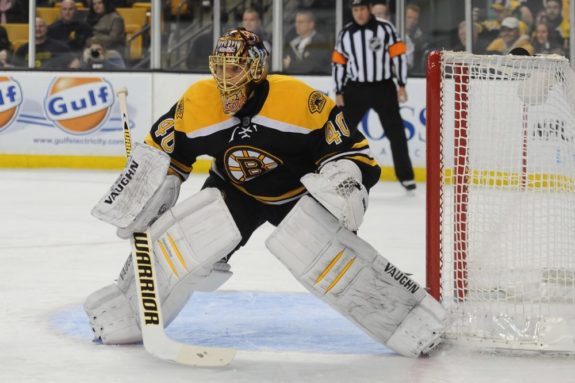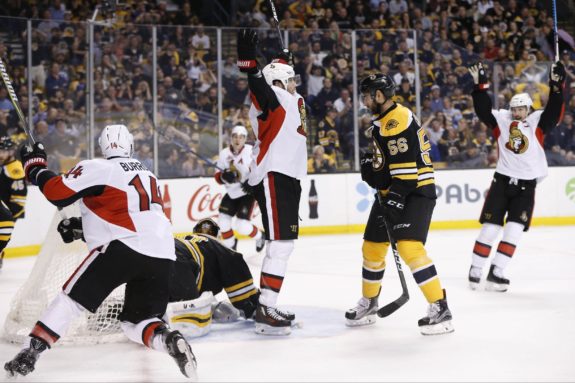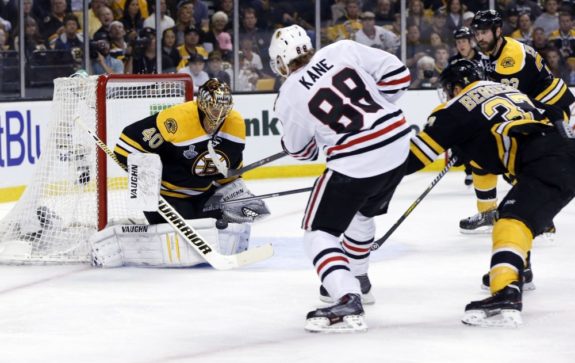“He can’t perform in the playoffs!”
“He always chokes when the game is on the line!”
“The B’s should trade him now!”
Everywhere you turn on Twitter, someone else has something negative to say about Tuukka Rask. Whether it’s warranted or not, no player has taken more criticism than him. If he plays a good game, it’s often dubbed lucky, while every loss is detrimental to his case.
Plain and simple, this just isn’t true. The Bruins have been going through a major re-tool during much of Rask’s stint as the Bruins’ starter. He’s been the reason why they were relevant during those trying seasons.

It took a few seasons for Rask to take over as the Bruins’ starter on a full-time basis. He started the lion’s share of games in the 2009-10 regular season, and played all 13 games of the Bruins’ playoff run. He ceded control of the net to Tim Thomas for the 2010-11 season, which proved crucial in the team’s run to winning the Stanley Cup.
He spent the next season as Thomas’ backup, before regaining control of the net for the shortened 2012-13 season. Since that point, he’s been the most reliable starting goalie in the league. Here’s what I mean:
Rask since 2012-13
(Stats min. 100 games played, as of Feb. 5, 2018)
Games played: 325 (1st)
Wins: 178 (2nd)
SV%: .922 (T-2)
GAA: 2.24 (1st)
Shutouts: 29 (T-1)
Based on these statistics, Rask should be said in the same breath as Braden Holtby, Henrik Lundqvist, Cory Schneider and Carey Price. He has been a stalwart between the pipes and has given the Bruins the luxury of focusing on improving other areas of the team.
It’s time to put this argument to bed once and for all. Let’s go through every argument that’s been brought up against Rask, and give pro-Rask Bruins’ fans every piece of information they need to defend their starting goalie.
He Can’t Perform in the Playoffs
This one is a simple misdirection of anger. The team around Rask can’t perform in the playoffs.

Starting with the numbers, Rask is 30-23 in the playoffs, with eight of those losses coming in overtime. He has a .928 save percentage and a 2.12 goals against average. These splits include his run in the 2010 playoffs, when the Hurricanes knocked the Bruins out in Game 7 of the second round. Let’s go year-by-year and break down how Rask did in each of his three playoff runs since taking over full-time, compared to his peers.
2013 Playoffs (min. 7 GP)
Wins: 14 (2nd)
Save %: .940 (1st)
GAA: 1.88 (4th)
Shutouts: 3 (T-1)
Result: Bruins lose in the Stanley Cup Final
Not bad, right? The one spot that people may point fingers is the goals against average. Keep in mind, however, that the goaltender in first was 1.84, just 0.04 ahead of Rask.
One of the largest storylines from this playoff run was the rash of injuries sustained on the Bruins’ blue line. The B’s lost Dennis Seidenberg, Wade Redden and Andrew Ference to injury, which led to Torey Krug getting his first big opportunity in the NHL.
With all due respect to Krug, Rask was put in a tough situation, and as the injuries piled up his play only improved. If you take away that brief defensive lapse that cost the Bruins the Stanley Cup Final (sorry for bringing it up), Rask may have even won the B’s their second Cup in three seasons.
2014 Playoffs (min. 7 GP)
Wins: 7 (6th, they were bounced in the second round)
Save %: .928 (1st)
GAA: 1.99 (1st)
Shutouts: 2 (T-1)
Result: Bruins lose in Game 7 of the second round to Montreal
The Bruins had a 3-2 lead in this series heading into Game 6 in Montreal.
The Bruins scored one goal over the next 120 minutes of hockey and lost the series in seven games.
Granted, he wasn’t as strong against Montreal as he was in the series prior, when the B’s beat the Detroit Red Wings in five games. The defense in front of him, though, was not championship-worthy. The team was relying on Torey Krug (age 22) and Dougie Hamilton (age 20) to play major minutes and be strong in their own end.
The offense was simply shut down in the series against Montreal and in the playoffs as a whole. The team’s leading scorer was Torey Krug, who put up 10 points in 12 games. He was the only skater to hit double digits in their 12-game playoff run.
These aren’t excuses for mediocre play in the final two games of that playoff run. All I’m saying is that, if he gets some offensive support, that series would’ve ended much sooner and in the Bruins’ favor.
2017 Playoffs (min. 7 GP)
Wins: 2
Save %: .920 (10)
GAA: 2.24 (6th)
Shutouts: 0
Results: Bruins lose in Game 6 in the first round against the Ottawa Senators

Fine, you got me there. He wasn’t stellar in last season’s playoffs. Here’s the thing though:
THREE OVERTIME LOSSES.
Sometimes, you just don’t get a bounce. Sometimes, you’re playing behind a team that’s relying on a 19-year old defenseman who had never played an NHL game before that series. Sometimes, that stuff happens.
Plain and simple, last year’s Bruins’ team was not ready to make a deep playoff run. Torey Krug and Brandon Carlo were both injured heading into the playoffs and the team missed their presences against the Sens. They were also down Adam McQuaid for most of the series, who can be a minutes-eater in the defensive zone.

Back to the original point — the B’s dropped three games in overtime against the Senators. The Sens, as you might remember, were an overtime goal away from going to the Stanley Cup Final, before ultimately falling to Pittsburgh.
Last year was the beginning of a transition. Claude Julien was fired and Bruce Cassidy was mere months into completely overhauling a failing team. Rask ended the regular season with 37 wins and a 2.23 goals against average.
You know who he was tied with in both metrics? Carey Price.
He got the team to the playoffs and was a few bad bounces from moving on.
He Was Bad in the 2015-16 Season
Even I shuddered a bit when I looked at Rask’s numbers from the 2015-16 season. If you don’t know what I mean, here they are, in the flesh:
Rask in 2015-16
Record: 31-22-8
Save %: .915
GAA: 2.56
Shutouts: 3
Bad. Simply bad and unacceptable.
I’m willing to forgive this season, to an extent. The defense around him was suspect at best and injuries were causing the Bruins to rely on players that they really shouldn’t have. Here’s what I mean:
- John-Michael Liles played 17 games and averaged over 19 minutes of ice-time.
- Zach Trotman played 38 games and averaged 18:33 per night.
- Dennis Seidenberg played so poorly that the team bought out his contract.
- Joe Morrow played 33 games (shivers).
- Matt Irwin was minus-five in his two-game stint to begin the season.
- They actually played Tommy Cross three games.

Their battered and broken defense was further compromised by an inconsistent offense that was in the midst of a turnover. David Pastrnak was not yet a regular, and the team even debated returning him to juniors. Strange, too, because all of the other young players under Julien seemed to fair just fine.
Also, Brett Connolly played 71 games. Need I say more?
On a serious note, however, this was a down year for Rask. It was also a down year for the team, which was unsure of its identity moving forward. Heck, had Rask’s down year in 2015-16 not happened, who knows who would be behind the bench in Boston.
He’s Being Paid Too Much
This is the typical line that fans use when they’re arguing that Rask should be traded. Not that everybody agrees, like Metro’s Danny Picard, but a lot of fans believe in this sentiment.
The long-and-short of it, though, is that $7 million is the going rate for a Vezina Trophy-winning goaltender. Two-time winner Sergei Bobrovsky is currently making $7.425 million against the cap, while Henrik Lundqvist is making $8.5 million. Carey Price is currently making $6.5 million this season, but his value skyrockets to $10.5 million next season, while Rask’s stays the same.

Rask’s current contract was a preemptive strike from the Bruins’ ownership. They knew that the value of a prominent starting goaltender was going to continue to rise, so they got in on the ground floor in order to avoid a contract like that of Carey Price.
Basically, if Pekka Rinne can make $7 million, than so can Tuukka Rask.
To tie these thoughts together, Rask has been the reason that the Bruins have stayed relevant during these tumultuous last few seasons. He’s played through the rise and fall of a coach, the trading of a number of promising young stars, and the ever-changing beast that was their defense.
If you want proof of just how good Rask can be with a good defense, look no further than this season. As I write this (Feb. 5), Rask is riding a 20-game point streak. He’s gone 18-0-2, and continues to be the driving force behind the Bruins’ ascent up the standings.

He provided the Bruins with a sense of stability that should never fly under-the-radar, but always does. Knowing that they could rely on Rask allowed the Bruins to focus their time, money and developmental resources on other problematic areas.
You can argue that Rask is no Carey Price, and you might win. You can argue that he’s not Braden Holtby even, and you might not win.
This, however, cannot be argued. Tuukka Rask is an elite goaltender in the National Hockey League, and deserves to be respected as such.